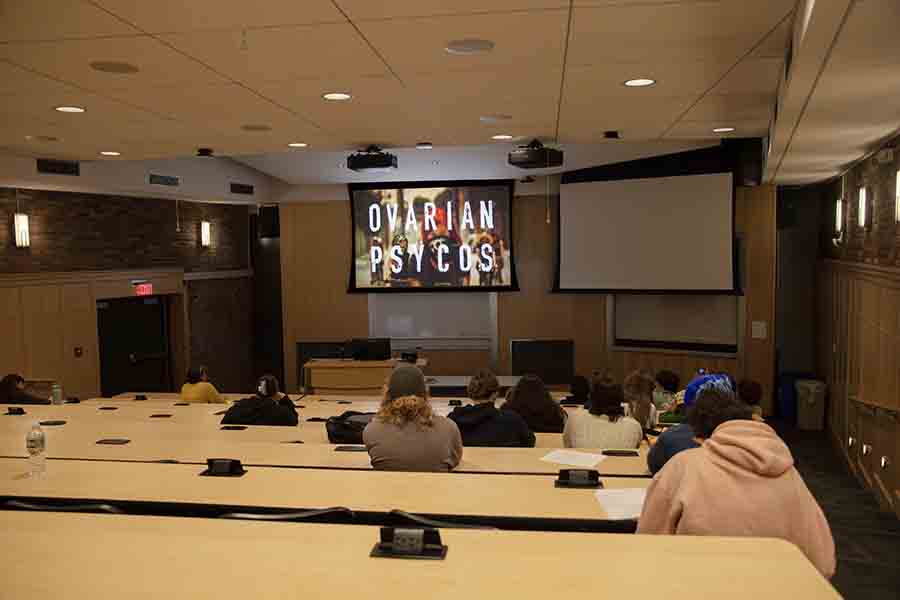As of Sept. 15, the 10th edition of Cine con Cultura began its premiere with screenings at viewing locations all over Ithaca. From Ithaca College’s very own Textor 102 to the big screens at Cinemapolis, the annual film festival screened just over a dozen new films from aspiring Latinx directors and screenwriters.
The program director for Cine con Cultura is Enrique Gonzalez-Conty, associate professor in the Department of World Languages, Literatures and Cultures and co-coordinator of the Latin American Studies Program. He is also an active member within Cultura Ithaca, a local organization that promotes Latinx voices. Gonzalez-Conty said he saw a unique opportunity to positively influence the development of Hispanic filmmakers in the world while also displaying the cultural relevance and perspectives behind each film.
“We want to bring films that are really recent that don’t really make it to Ithaca,” Gonzalez-Conty said. “These films have to compete with Hollywood films, and most of the time they don’t make it. Even if they win prizes internationally, it’s really hard to bring them in.”
The atmosphere for each screening felt incredibly personal because of the content being shown. Junior Javier Montoya, a student volunteer, said many Hispanic filmmakers who attended their screenings gave small introductions to their specific documentaries and features so that the audience could understand the significance behind each project and why, personally, the story captivates the filmmaker.
“Cultura Ithaca truly means ‘the cinema with culture,’” Montoya said. “It’s not all from Mexico: there’s a lot of background. You need to understand what country you’re going into, mind–wise, before watching because there’s a lot of cultural significance between the countries of Latin America.”
The biggest component for Cine con Cultura is the clear focus on human rights. Gonzalez-Conty said several local businesses are run by families that come from Latin American countries. A pizza place in town, Pizza Aroma, was founded by El Salvadoran immigrants who escaped the civil war in their home country. He said making these connections between the film and the community is essential to raising awareness.
“Many migrants in Latin America that migrated for political reasons — due to governments prosecuting them in the 70s and 80s — ended up here in Ithaca.” Gonzalez-Conty said. “People who escaped the violence of Chile’s coup in 1973 are still living here today. These kinds of connections are what CUSLAR has been teaching us. It’s a really nice way to connect the grassroots initiative to the festival.”
Aside from Ithaca’s own residents, most of the films cover fiction and non-fiction stories on how human rights have been violated across Latin American cultures. “Transfariana,” directed by Joris Lachaise, tells the story of a transgender woman in a war-torn Colombia. The main character falls in love with a member of the guerilla group FARC, and the two have to struggle to survive amid scandal and persecution. Gonzalez-Conty said the story speaks to the lack of trans rights in Colombia, resulting in a violation of human rights as a whole.
Gonzalez-Conty said student participation in getting the word out for the festival has been a major contributing factor in event numbers. Working closely with several different students to increase word-of-mouth coverage on Cine con Cultura, he has employed social media tactics in order to encourage students and locals to attend the screenings, on top of the standard flyers and posters across town.
Senior Andres Hernandez and juniors April Cascante and Montoya were student volunteers involved in social media work for one film each.
Hernandez talked about his personal connection with the film “Buena Vista Social Club.” The film’s documentary on Afro-Cuban singers bringing their music to international audiences resonated heavily with Hernandez, originally premiering at the Berlin Film Festival by director Wim Wenders. Being Cuban himself, Hernandez said his social media work reinforced why Cine con Cultura is so important: sharing perspectives that are not normally shared on the big screens.
“You have a chance here to familiarize yourselves with a culture that is often misrepresented in American M media, especially during an election year,” Hernandez said. “A lot of perception is influenced by immigrant talking points. … Regardless of your stance, nobody should make stereotypes or assumptions based on where you’re from.”
Cascante shared the film festival’s impact on their Hispanic heritage through “Clara Sola”, a Costa Rican film directed by Nathalie Álvarez Mesén. Cascante said the powerful women portrayed throughout the film spoke to their desire to make sure strong diverse voices are heard.
“It speaks in the context of Latina women in systems of oppression, religiously and autonomy wise,” Cascante said. “It’s about Costa Rican culture, which is so underrepresented in films today. That representation was very moving to me.”
Certain films are still being screened until Oct. 23, including “Pepe” at Cornell Cinema on Oct. 10 and “Tierra Adentro” in Textor 102 on Oct. 23. Between every country of Latin America, stories are told needing stronger recognition in the film world. Displaying documentaries and features on the Latinx perspective, and the rights that are constantly at stake through their country’s struggles, is what Cine con Cultura strives to do every year.
“These are beautiful cultures.” Hernandez said. “These are intelligent people. These are artistic people that are extremely varied and diverse in their own right. You can learn about it, or even fall in love with it, if you’re interested.”















